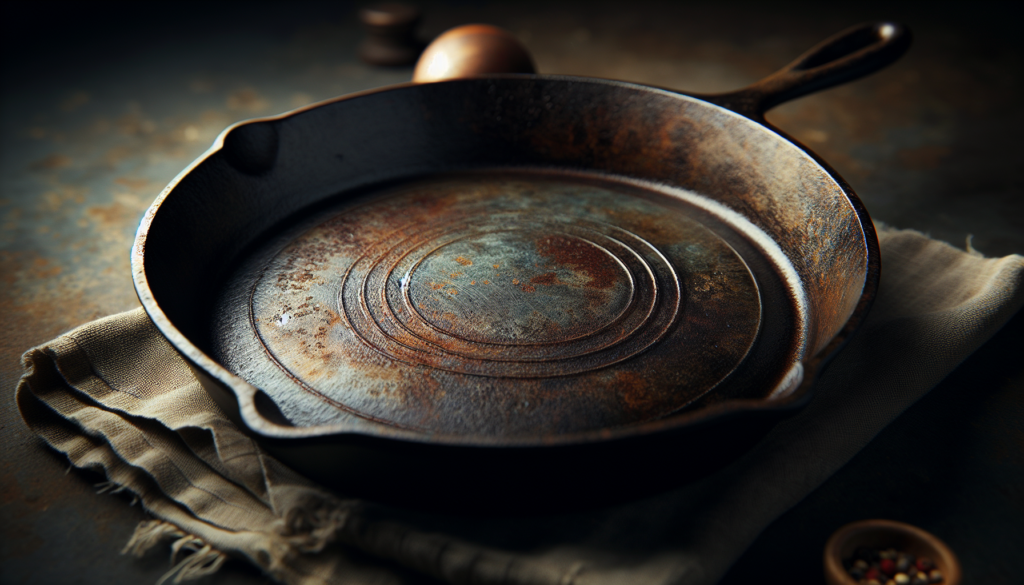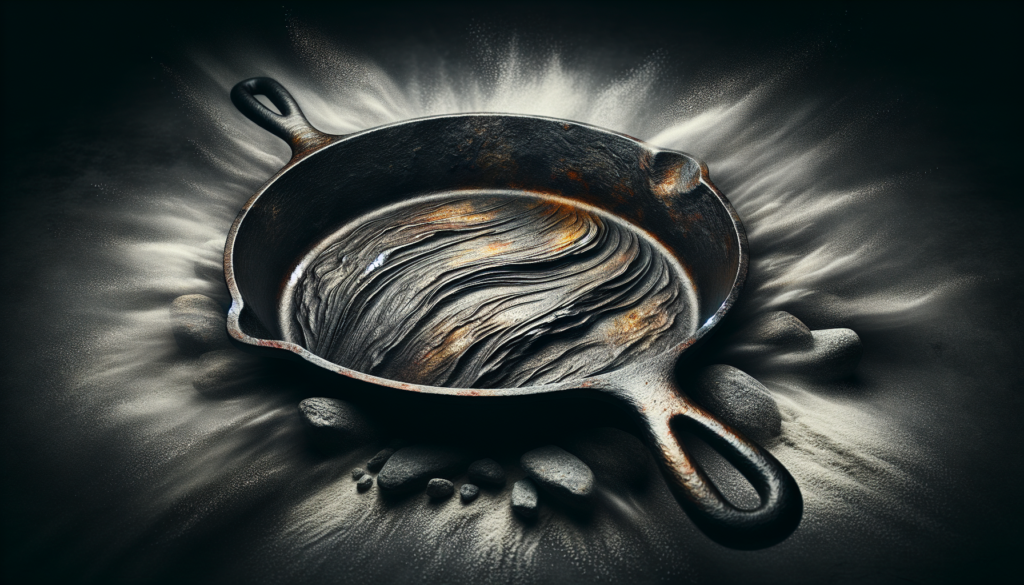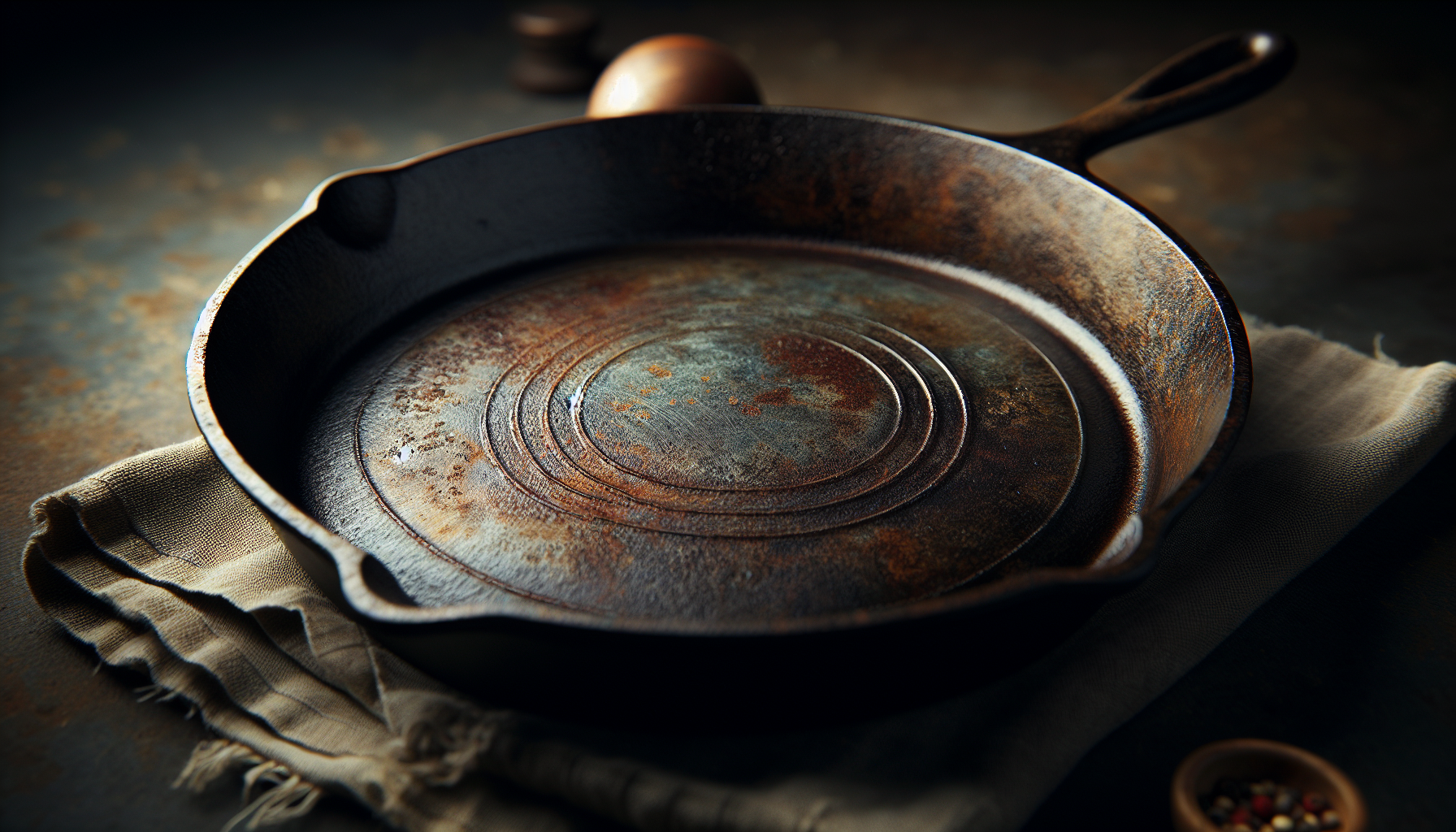Have you ever wondered if it’s normal for a cast iron pan to rust? Well, you’re in the right place! In this article, we’ll be addressing this common concern among cast iron enthusiasts. While cast iron pans are cherished for their durability and versatility, they do require some special care to keep them rust-free. We’ll explore the causes of rust, preventive measures, and ways to restore your pan if it does happen to rust. So, if you’re ready to learn how to keep your cast iron pan in tip-top shape, let’s get started!
Understanding Cast Iron Pans
Introduction to cast iron pans
Cast iron pans have long been a beloved staple in kitchens around the world. With their durable construction and excellent heat retention properties, these pans are perfect for a wide variety of cooking tasks. Whether you’re searing a steak, sautéing vegetables, or baking a mouthwatering cornbread, a cast iron pan can handle it all.
However, one common concern among cast iron pan owners is the issue of rust. In this article, we will delve into the world of cast iron pans, exploring their advantages, proper maintenance techniques, and how to prevent and deal with rust effectively.
Advantages of using cast iron pans
There are numerous advantages to using cast iron pans in your daily cooking endeavors. Firstly, cast iron pans provide exceptional heat distribution, ensuring that your food cooks evenly. This even heat distribution is especially valuable when searing meats or baking delicate pastries.
Additionally, these pans are incredibly durable and can withstand high temperatures, making them perfect for both stovetop and oven use. Another advantage of cast iron pans is their ability to enhance the flavors of your food. Over time, the pan develops a seasoned layer that adds depth and richness to your culinary creations. Finally, cast iron pans are versatile and can be used on various heat sources, including gas, electric, and even open flame.
Maintenance and care of cast iron pans
To keep your cast iron pans in pristine condition and ensure their longevity, proper maintenance, and care are essential. One crucial aspect of maintaining cast iron pans is preventing rust. Rust occurs when the iron in the pan reacts with oxygen and moisture, leading to the formation of iron oxide.
While it may seem concerning, with the right knowledge and techniques, rust can be easily avoided and treated. By following a few simple steps, such as seasoning your pan regularly and keeping it dry, you can keep rust at bay and enjoy your cast iron pan for years to come. Now, let’s dive deeper into the topic of rust and cast iron pans.
Rust and Cast Iron Pans
What causes cast iron pans to rust?
Cast iron pans are susceptible to rust due to their iron composition. When exposed to moisture and oxygen, iron undergoes a chemical reaction that results in the formation of rust. While this may sound alarming, it’s important to note that rust is a surface issue and can be effectively dealt with through proper maintenance.
By understanding the factors that contribute to rusting and the difference between seasoning and rusting, you can take the necessary steps to prevent and address rust in your cast iron pans.
Factors that contribute to rusting
Several factors can contribute to the rusting of cast iron pans. One primary factor is exposure to moisture. When a cast iron pan is not properly dried after washing or comes into contact with water during cooking, moisture can seep into the surface of the pan and initiate the rusting process. Another contributing factor is exposure to oxygen. Leaving a cast iron pan exposed to the air for extended periods, especially in areas with high humidity, can accelerate the formation of rust.
Lastly, acidic foods, such as tomatoes or citrus fruits, can also promote rusting in cast iron pans. The acidic nature of these foods can cause the seasoned layer of the pan to erode, leaving the iron vulnerable to rust formation.
Difference between seasoning and rusting
It’s essential to understand the difference between seasoning and rusting when discussing cast iron pans. Seasoning refers to the process of adding a thin layer of polymerized oil to the pan’s surface. This layer not only creates a non-stick coating but also protects the pan from rust.
Seasoning is achieved by applying a thin layer of oil to the pan, heating it until it reaches its smoke point, and allowing the oil to polymerize onto the pan’s surface. On the other hand, rusting occurs when the iron in the pan oxidizes, leading to the formation of iron oxide, or rust. While seasoning can help prevent rust, it is not a foolproof method and proper care is still necessary to avoid rusting.
Common misconceptions about rust and cast iron pans
There are several common misconceptions surrounding rust and cast iron pans. One of the most prevalent misconceptions is that a rusty pan is beyond repair or safe to use. In reality, minor rust can be easily treated, and the pan restored to its former glory. Another misconception is that the presence of rust automatically means the pan is unclean. Rust is merely a surface issue and does not affect the cleanliness of the pan.
With proper cleaning and maintenance, a rusty pan can be made safe to use again. Lastly, some people believe that a rusty pan imparts a unique flavor to their food. While seasoned cast iron pans do add flavor to dishes, rust itself does not contribute any desirable flavors and should be addressed promptly.

Preventing Rust in Cast Iron Pans
Proper seasoning of cast iron pans
Proper seasoning is the key to preventing rust in cast iron pans. Seasoning creates a protective layer on the pan’s surface, preventing moisture from coming into direct contact with the iron. To season your cast iron pan, start by thoroughly cleaning it with warm water and a bar of mild dish soap. Once clean, dry the pan completely using a cloth or paper towel. Next, apply a thin layer of vegetable oil or solid shortening to the pan, making sure to cover the entire surface, including the handle. Place the pan upside down in an oven preheated to 350°F (175°C) and let it bake for an hour. After the hour is up, turn off the oven and allow the pan to cool completely before removing it. Repeat this seasoning process regularly to maintain a strong protective layer on your cast iron pan.
Cleaning and drying techniques
Proper cleaning and drying techniques are crucial in preventing rust in cast iron pans. To clean your pan, avoid using harsh detergents or scrub brushes, as these can strip away the seasoned layer. Instead, use a gentle scrub brush or sponge and hot water to remove any food residue. If needed, a small amount of salt can be used as an abrasive to lift stuck-on food. Once clean, dry the pan immediately using a cloth or paper towels. It’s essential to remove all moisture from the pan to prevent rust formation. If necessary, you can place the pan over low heat on the stovetop for a few minutes to ensure it is completely dry.
Storing cast iron pans
Proper storage of cast iron pans is crucial to prevent rust. Avoid stacking multiple pans together, as the weight of the upper pans can damage the seasoned layer of the lower pans. Instead, store your cast iron pans individually, either by hanging them or using a layer of paper towels or felt between the pans to prevent them from touching. Additionally, make sure your cast iron pans are stored in a dry environment with low humidity. Moisture in the air can contribute to rust formation, so it’s best to store your pans in a cool, dry place.
Avoiding exposure to moisture
As mentioned earlier, moisture is one of the primary culprits of rust formation. To prevent rust, it’s essential to avoid exposing your cast iron pans to excessive moisture. Avoid submerging your pans in water for extended periods, as this can compromise the seasoned layer and lead to rusting. Instead, opt for a gentle cleaning method using hot water and avoid leaving the pan soaking in the sink.
Additionally, it’s important to dry the pan thoroughly after each use and avoid storing it while damp. By taking these precautions, you can greatly reduce the risk of rust forming on your cast iron pans.
Using cast iron pans regularly
Regular use of your cast iron pans can actually help prevent rust. The more you use your pan, the more it develops and strengthens its seasoned layer. The oils and fats from cooking act as a natural barrier against rust formation. So, don’t be afraid to reach for your cast iron pan regularly and incorporate it into your daily cooking routine. By using the pan frequently, you’ll not only enjoy the numerous benefits of cast iron cooking but also maintain a strong and resilient pan that is resistant to rust.
Dealing with Rust in Cast Iron Pans
Identifying rust spots
Despite your best efforts, rust may still make an appearance on your cast iron pan. It’s essential to identify rust spots early to address the issue promptly. Rust spots typically appear as reddish or brownish discoloration on the surface of the pan. If left untreated, the rust spots can spread and deepen, eventually compromising the integrity of the pan. Regular inspection of your cast iron pans can help you catch rust early and prevent further damage.
Removing rust from cast iron pans
To remove rust from your cast iron pan, start by thoroughly scrubbing the affected area with a scrub brush or sponge and hot water. You can also use a small amount of dish soap to aid in the process. Avoid using steel wool or abrasive cleaners, as they can damage the seasoned layer. Once the rust has been scrubbed off, rinse the pan thoroughly and dry it immediately. To further eliminate any remaining rust particles, you can apply a paste of baking soda and water to the affected area and scrub gently. After the rust has been removed, proceed with re-seasoning the pan to restore its protective layer.
Restoring and re-seasoning rusted pans
If your cast iron pan has extensive rust or shows signs of deterioration, it may require a more thorough restoration process. Start by scrubbing off the rust using the methods mentioned earlier. Once the rust is removed, assess the condition of the pan. If there are any cracks or extensive damage, it may be best to retire the pan and invest in a new one. However, if the pan is still salvageable, proceed with re-seasoning. Thoroughly clean the pan, dry it completely, and apply a fresh layer of oil or shortening to the entire surface. Bake the pan in an oven preheated to 350°F (175°C) for an hour, then let it cool completely. Repeat this process a few times to build up a strong seasoned layer and restore the pan’s functionality.
Seeking professional help for severe rust issues
In some cases, severe rust issues may require the assistance of a professional. If your cast iron pan has significant rust and damage that cannot be easily addressed through regular maintenance and restoration techniques, consider reaching out to a professional cast iron refinisher. These experts have the knowledge and tools to restore your pan to its former glory, ensuring that it is safe to use and free from rust. While professional help may come at an additional cost, it can be a worthwhile investment if you have valuable or sentimental cast iron pans that need expert attention.

Alternative Methods for Rust Prevention
Using enamel-coated cast iron pans
If you want to avoid the hassle of seasoning and preventing rust altogether, enamel-coated cast iron pans are a suitable alternative. These pans are coated with a layer of enamel, which acts as a protective barrier against rust. The enamel coating also eliminates the need for seasoning, making the pans easier to clean and maintain. However, it’s important to note that enamel-coated cast iron pans may not provide the same heat retention and distribution as traditional seasoned pans. Consider your cooking needs and preferences before deciding on an enamel-coated cast iron pan.
Other types of cookware for rust prevention
If you’re concerned about rust but still desire the benefits of cast iron cooking, there are other types of rust-resistant cookware available. Stainless steel, carbon steel, and non-stick pans are all viable options that provide excellent heat distribution and are resistant to rust. While these alternatives may not offer the same flavor-enhancing properties as seasoned cast iron, they are reliable choices that can meet your cooking needs without the worry of rust formation.
Cast iron alternatives with rust-resistant properties
For those who prefer the qualities of cast iron but want a pan with built-in rust resistance, there are cast iron alternatives available. Some manufacturers produce cast iron pans with added elements, such as chromium or nickel, which provide rust-resistant properties. These pans offer the best of both worlds – the durability and heat retention of cast iron combined with improved resistance to rust. If you’re particularly concerned about rust and want a long-lasting pan, consider exploring cast iron alternatives with rust-resistant properties.
Frequently Asked Questions
Can rust be harmful if ingested?
No, rust itself is not harmful if ingested in small quantities. The iron oxide formed during the rusting process is typically inert and passes harmlessly through the digestive system. However, it is best to remove rust from your cast iron pans before cooking with them, as it can affect the taste and appearance of your food.
Calphalon cookware 10-Piece Cookware review
Is there a way to prevent rust without seasoning?
Seasoning is the most effective way to prevent rust in cast iron pans. However, if you prefer not to season, you can opt for alternative rust-resistant cookware options, such as stainless steel or non-stick pans, as mentioned earlier.
Why do some people prefer rusty cast iron pans?
Some people prefer rusty cast iron pans for various reasons. First, the presence of rust can give a pan a unique, vintage look that adds character to the kitchen. Additionally, seasoned cast iron pans develop a natural non-stick surface over time, and some individuals find that a slight rust patina enhances this non-stick quality. However, it’s important to note that rust can affect the taste of certain dishes and requires careful maintenance to ensure safe and hygienic cooking.
Can rust affect the taste of food cooked in a cast iron pan?
Yes, rust can potentially affect the taste of food cooked in a cast-iron pan. Rust can introduce undesirable flavors and discoloration to your dishes. To avoid any taste or appearance issues, it’s crucial to promptly address rust and maintain a well-seasoned cast iron pan.
How often should cast iron pans be seasoned?
The frequency of seasoning depends on how often you use your cast iron pan and the quality of its seasoned layer. As a general guideline, it is recommended to season your pan every few months or after intense cleaning sessions. Regular use and proper cleaning and drying techniques can help maintain a strong seasoned layer and reduce the need for frequent seasoning.
Conclusion
In conclusion, rust can be a common concern for cast iron pan owners, but with proper understanding, it can be effectively prevented and treated. Cast iron pans offer numerous advantages in the kitchen, from excellent heat distribution to enhanced flavors in your dishes. To keep your cast iron pans in top shape, it’s crucial to follow proper maintenance and care techniques.
Regular seasoning, thorough cleaning and drying, and avoiding exposure to moisture are essential steps in preventing rust. However, if rust does appear, it can be addressed through careful inspection, removal, and restoration. Alternatively, you may consider exploring enamel-coated cast iron pans or other rust-resistant cookware options.
By understanding the facts about rust and cast iron pans, you can enjoy the many benefits of cast iron cooking while keeping rust at bay. Remember, proper maintenance is key to the longevity and performance of your beloved cast iron pans.




